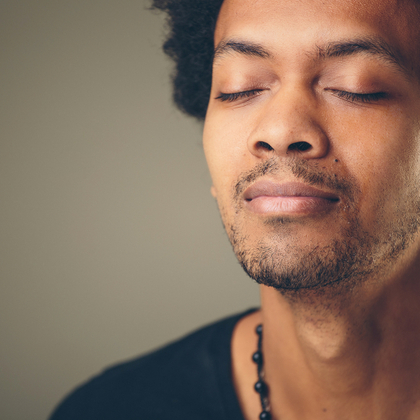
Drifting into quality sleep isn’t always easy — especially for those who experience nocturnal panic attacks. Rousing during the night to discover you’re having a panic attack can be a frightening and overwhelming experience. Stirring from fragmented sleep can leave you lethargic and groggy, too, which can intensify the sensation and make you panic even more.
But while nocturnal panic attacks can be stressful, they can be effectively managed with through a range of methods, from relaxation techniques to natural supplementation. We’ll take a closer look at how to manage panic attacks at night to help you achieve a peaceful night’s sleep.
What is a nocturnal panic attack?
Panic attacks are unexpected, sudden episodes of intense anxiety or fear. Those who experience panic attacks while awake can often identify triggers (such as stress), however nocturnal panic attacks can happen without a trigger, often waking a person from sleep. Nocturnal panic attacks trigger the same symptoms as they would during the day, just at night. These include:
-
Feeling dizzy, lightheaded, or faint
-
Feeling disconnected from your surroundings and out of control
-
Increased heart rate
-
Shortness of breath (hyperventilating) and chest pains
-
Excessive sweating and fluctuating body temperature
-
Shaking or trembling
-
Palpitations and muscle spasms
-
Tingling and numbness
Although nocturnal panic attacks typically last for only a few minutes, it’s much harder to calm yourself down and fall asleep again. Worrying about whether you may have another panic attack can also lead to insomnia and sleeping difficulties.
What causes panic attacks at night?
Although it’s not known for certain what causes nocturnal panic attacks, some factors may increase the risk of experiencing them:ii
-
Chronic stress
-
Dwelling on anxious thoughts before bed
-
Mental health conditions such as depression, anxiety, obsessive-compulsive disorder, or post-traumatic stress disorder
-
Genetics – sometimes having a close relative who experiences panic attacks can increase your risk of developing them
-
Managing chronic illness such as cancer, for instance
-
Alcohol or medication withdrawal
-
Life changes e.g. bereavement, losing a job, or moving house
-
Consuming stimulants such as caffeine or nicotine
-
Worrying about the state of the world — politically, socially, or environmentally
How to manage panic attacks at night
Breathe through it
Relaxation is key to managing nocturnal panic attacks. During an attack, try to regulate your breathing: inhale deeply and exhale fully. It can be helpful to turn your mind to happy images and thoughts. Be mindful that panic attacks are harmless and temporary. Remind yourself the sensations you’re experiencing are the result of anxiety — nothing more. Why not try these 6 mindfulness techniques to help you sleep.
Tips to prevent nocturnal panic attacks
There’s no simple cure for panic attacks at night, but there are a few preventative measures you can take to promote relaxation before bed.
-
Stick to a consistent, healthy sleep regime — to go to bed and wake up at the same time every day.
-
Limit caffeine, alcohol, and sugar consumption before bed as these substances can make you feel nervous and jittery at night.
-
Stop using electronic devices 90 minutes before bed —the blue-light emitted from your gadgets inhibits the production of your sleep hormone.
-
Avoid stressful scenarios before bed — don’t watch the news, a thriller, or discuss stressful or financial matters before bed.
-
Try herbal remedies — consider taking a natural sleep supplement or using essential oils to promote sleep and relaxation naturally.
Want to learn more about how to achieve a more restful sleep? Explore the rest of our sleep hub.
References:
-
nhs.uk. (2019). Panic Disorder. Available online: https://www.nhs.uk/conditions/panic-disorder
-
Timothy. J., Legg. C. (2019). Panic attacks at night: Causes and how to cope. Medical News Today. Available online: https://www.medicalnewstoday.com/articles/324531.php
Related Posts

Olivia
Olivia Salter has always been an avid health nut. After graduating from the University of Bristol, she began working for a nutritional consultancy where she discovered her passion for all things wellness-related. There, she executed much of the company’s content marketing strategy and found her niche in health writing, publishing articles in Women’s Health, Mind Body Green, Thrive and Psychologies.
View More



